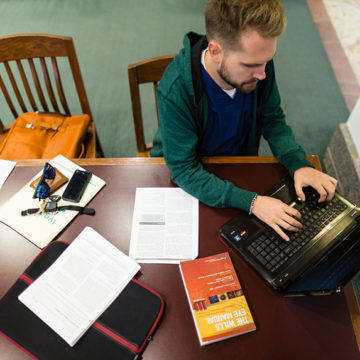The top 5 things I learned in my first year at NECO

The top 5 things I learned in my first year at NECO
It’s already February, which means that I officially survived my first semester at NECO and the second half of the year is already well underway.
Since midterms are coming up in a few weeks, I wanted to look back and remind myself about all of the things I’ve learned since I’ve gotten here–and give any prospective applicants an idea of what your first semester here will be like!
When I arrived in Boston in August, I was venturing into completely unfamiliar territory. I’d never spent any time in the city other than for my interview and to search for an apartment, and I was launching myself from four years at a small liberal arts college in Ithaca, New York–where my classes spanned a wide range from science to science fiction writing–to a completely novel experience at NECO. I wasn’t quite sure what to expect, but found myself quickly submerged into an entirely unique experience:
- We start working with patients not just in our first year, but in our first few months at NECO.
I started classes in the first week of September, and my first vision screening at a Head Start program outside of Boston was in October. I was both excited and intimidated by the prospect of practicing procedures on patients so early, especially when I arrived at the school and realized that I was going from working with my classmates in their twenties to Head Start students who ranged in age from two to four years old. Generally, when you tell a classmate to “look at the big E,” they will look at the big E, but working with children is a lot more challenging because you have to be both clinician and entertainer, coming up with new ways to hold their attention. Although difficult, it was extremely rewarding to be able to work with children so early on, because you learn very quickly how much more complicated patient care can be outside of a classroom and that part of dealing with patients means learning to adapt and improvise. It may even mean dancing around and pointing at different things on the wall of a classroom to try and distract a child long enough for one of your classmates to look at her pupils. - We work really hard, but we also have a lot of fun.
I have been extremely impressed by the large number of school events, especially during the beginning of the semester. The NECO community is small enough that almost everyone attends the events, and they were a great way to meet and get to know a lot of my classmates. In addition to NECO-sponsored events at local bars and clubs, like a Halloween party where our class president dressed up as a transilluminator, there are also events at the school itself, like the VOSH casino night fundraiser, where I played blackjack (and didn’t do too badly!). - We don’t just read about eyes in textbooks–we literally hold eyes in the palm of our hands.
It’s a lot easier to understand difficult concepts when they’re reinforced in lab. Since there’s a lab for essentially all of our classes, we are able to learn things in different ways and see in real life what we are discussing. In one of my more memorable lab experiences, we dissected cow eyes and I was able to feel the toughness of the sclera and see the clarity of the lens in person–and even hold the eye on my fingertip to flip it inside-out and examine it from all angles. It’s easy to struggle with learning something when you can’t picture it clearly, but when you’re holding a brain in your hands in Anatomy and Physiology lab, or performing retinoscopy on a classmate in PPO lab, or experimenting with optical illusions in TMVT lab, it’s a lot more interesting–and a lot more fun! - We spend a lot of time staring into each others’ eyes.
Although we do go on screenings every few weeks to work with real patients, the first place we learn procedures is in PPO lab, by practicing on each other. It was nerve-wracking at first to try new procedures on someone you didn’t know, but it’s also a great way to meet your classmates and bond over understanding something new. You’ll find out a lot of your classmates’ eye issues–we all decided to become optometrists, which means that the majority of us have some refractive error (at least!) to work with. It makes the labs more challenging, since it’s rare that you’ll be working with a classmate with perfect eyes, and it also better prepares us for seeing different types of patients in the future. - We don’t just learn about eyes.
As a beginning optometry student, it was easy to assume that my classwork would be mainly eye-related; and it is, to a point. But I also learned very quickly that as optometrists, we can’t merely look at a patient and see a floating pair of eyes–we need to consider the person as a whole. Even in our first year, we start learning about how the body functions systemically in order to get a better picture of why certain eye disorders occur and how crucial it is to understand the emotional experience of the patient along with the medical aspect.
My first year so far has been filled with so many new experiences, and I’m excited to see what else is ahead.
Until next time!